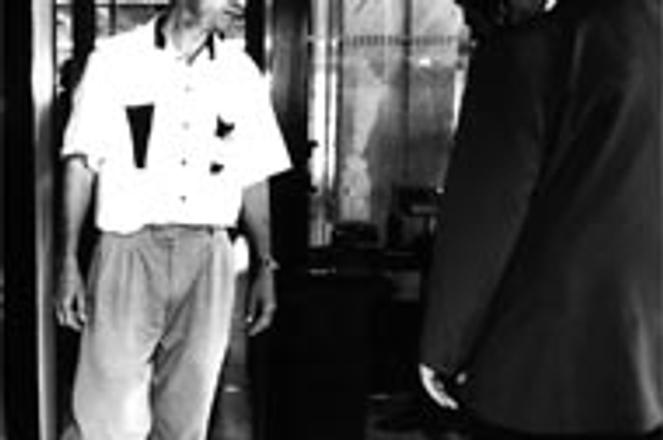Former HZDS MP František Gaulieder passes a metal detector as he revisits the site of his ouster, Parliament.Alan Hyža
For three consecutive days, deputies from all three parties that form the ruling coalition in the Slovak Parliament refused to vote on reinstating ousted deputy František Gaulieder, a ruling coalition deputy booted out last December, though a Constitutional Court ruling in July left the matter up to the chamber to put him back in.
No-show drama
On August 26 at 13:30, half an hour after the scheduled start of the special session, called by 39 opposition deputies, the ruling coalition's seats were still empty. Sixty four opposition deputies declared themselves present, 12 short of a quorum needed to stage the vote. Many ruling coalition deputies were hanging around the chamber and strolling outside the building, but refused to enter and declare themselves present.
Parliamentary Speaker Ivan Gašparovič then postponed the session to the next day, as he is bound to by the chamber's protocol. But nothing changed that day, either.
The following day, August 28, the third time the session had been called, the Parliament building resembled a déja vu experiment, with coalition deputies avoiding their seats.
Finally, on September 2, after the four-day weekend during which ruling coalition deputies ironically celebrated the Slovak Constitution's fifth anniversary, Gašparovič proclaimed the special session to be over.
The same day, 33 opposition deputies requested Gašparovič to call a new special session. "We are prepared to request a special session every day until the Gaulieder case is solved," said Ján Čarnogurský, chairman of the Christian Democratic Movement (KDH).
Parliament booted Gaulieder out of the chamber on December 4, 1996, with most coalition deputies voting for a resolution which stated that the deputy wrote a letter saying he wanted to resign. However, Gaulieder insists he never wrote the letter and has repeatedly stressed he wants to retain his seat.
On July 23, the Constitutional Court ruled that parliament's resolution violated Gaulieder's constitutional rights, because "his mandate was terminated in a way not envisioned by the Constitution." The Court then left it up to parliament to rectify the situation.
Based on the ruling, opposition deputies requested a special session to reinstall Gaulieder as a regular deputy again.
But coalition deputies were not in favor of the move. "I will vote against Gaulieder's return to the chamber," said Arpád Matejka, the vice-chairman of the Movement for a Democratic Slovakia (HZDS), Gaulieder's former party. "It's their business, what the Constitutional Court has ruled, but there is another question: Why don't you ask voters who voted for Gaulieder [in 1994] what they think?"
While Gaulieder's former party-mates ignored the court's ruling, Prime Minister Vladimír Mečiar accused Gaulieder in a TV debate of trying to trade his mandate back to Mečiar's HZDS for 15 million Sk ($429,000).
"While Gaulieder was a HZDS deputy, he authorized the HZDS to send [a letter on] his resignation in case he would become a member of some other club," Mečiar said in a regular TV debate called 'What shall we do now, Mr. Premier?' It was the premier's first comment on the matter.
Mečiar continued that after Gaulieder left the HZDS club in November 1996, one HZDS official negotiated with him on the matter of willfully returning his mandate back to the HZDS. "Gaulieder's condition then was: pay me 15 million crowns," Mečiar said. "He got a vague promise on this from the official. Based on that, Gaulieder did sign a statement in which he gave up his deputy mandate."
Mečiar claimed the HZDS official, whose name he refused to reveal, then sent the letter to Gašparovič. Consequently, parliament staged the vote on accepting the letter Gaulieder claims was forged. "He did say in parliament that he didn't want to give up his mandate," Mečiar said, "but it was after he found out the money hadn't come."
In an interview for the independent Radio Twist, Gaulieder rejected Mečiar's allegations. "I absolutely didn't ask for anything," he said. "The HZDS deputy club chairman, Tibor Cabaj, together with Gašparovič tried to solve the problem with my mandate, asking me to give [it] up and tell them my conditions for doing it in return. Of course, I refused."
Gaulieder added that Vladimír Poór, a top HZDS official from the Trnava region where Gaulieder is from too, tried twice later to offer him money for his mandate, with the same result. "So, these were not my conditions, but HZDS offerings to make me give up my mandate," Gaulieder said.
With HZDS and Slovak National Party (SNS) deputies seemingly firm in their anti-Gaulieder stance, opposition's hopes are focusing on the other junior coalition party, the Association of Slovak Workers (ZRS).
"There is some movement in the ZRS club regarding the Gaulieder case," said Eduard Kukan, chairman of the opposition Democratic Union. "I'm not overly optimistic, but I think we can realistically expect that a majority of their deputies will vote for Gaulieder's return. But I don't expect it to happen tomorrow."


